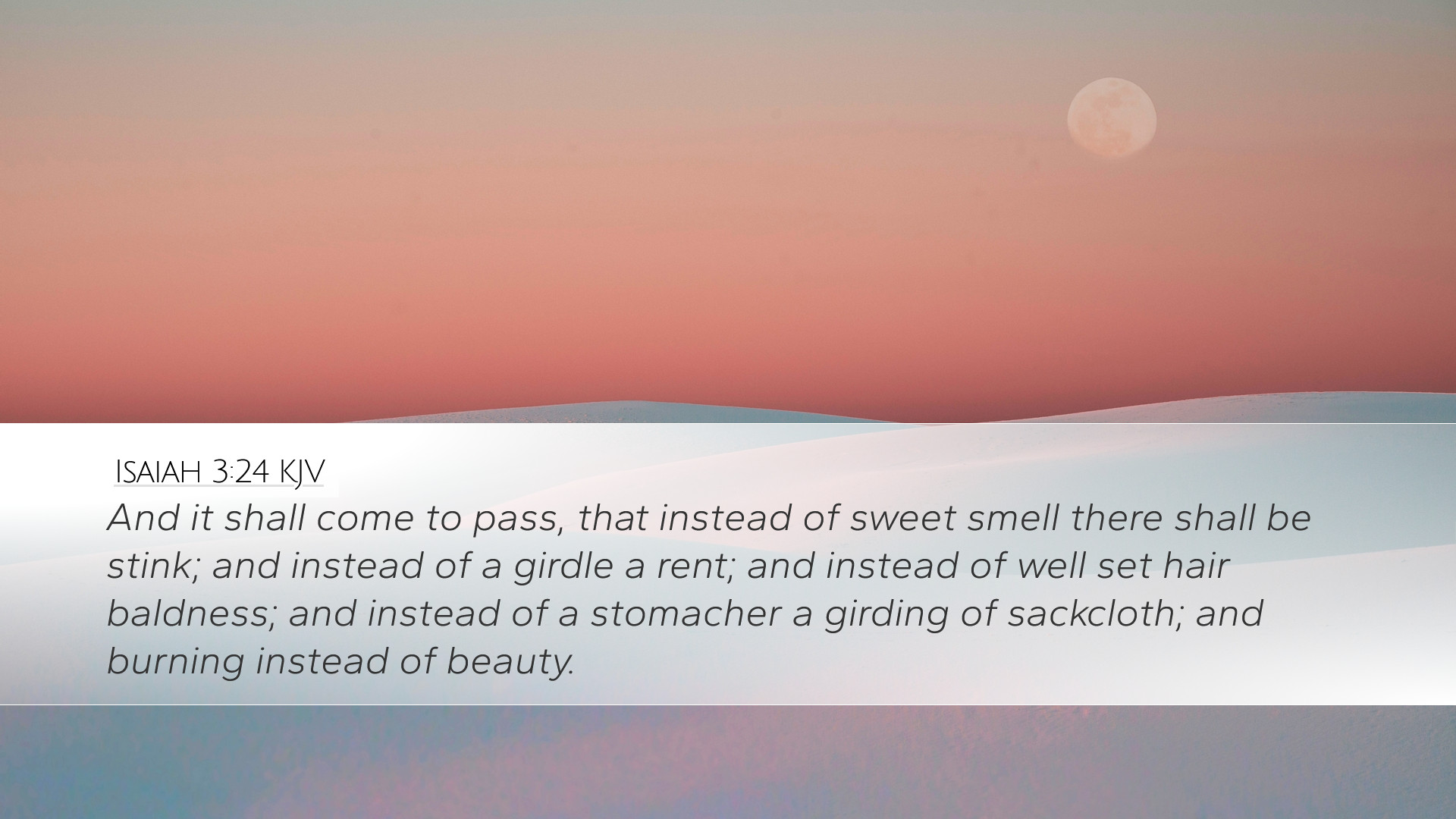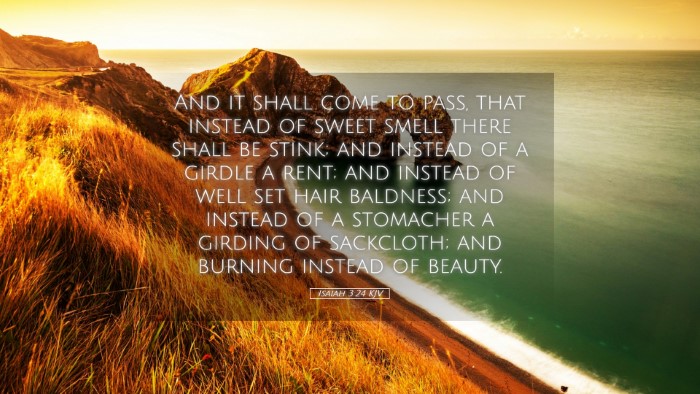Commentary on Isaiah 3:24
Isaiah 3:24 (KJV): "And it shall come to pass, that instead of sweet smell there shall be stink; and instead of a girdle, a rent; and instead of well-set hair baldness; and instead of a stomacher a girding of sackcloth; and burning instead of beauty."
This verse serves as a powerful condemnation of the vanity and excess prevalent in Jerusalem and Judah during the time of Isaiah. The imagery used is rich and poignant, reflecting the spiritual and moral decay of the society.
Contextual Overview
Isaiah chapters 1 to 5 present God's judgment against Judah, where the prophet warns them about the consequences of their sinfulness. The context of Isaiah 3 focuses on the leaders and the women of Jerusalem, pointing to their pride and the futility of their adornment in light of impending judgment.
Symbolism in the Verse
- Sweet Smell vs. Stink: The sweet smells associated with perfume and celebration signify pleasure and acceptance from God. In contrast, the "stink" symbolizes divine judgment and disfavor. As Matthew Henry explains, the degradation from sweetness to stench highlights a reversal of fortune and God's displeasure with the people's idolatry.
- Girdle vs. Rent: A girdle symbolizes dignity and self-respect. The reference to a "rent" indicates a significant loss—spiritual and social fabric has been torn apart. Adam Clarke posits that the tearing of garments signifies mourning and imminent sorrow.
- Well-set Hair vs. Baldness: The beauty and care of hair express a sense of pride, self-enhancement, and societal norms of femininity. Instead, baldness is a sign of disgrace, loss, and humiliation, indicating that beauty will be replaced with shame and desolation.
- Stomacher vs. Girding of Sackcloth: The stomacher—an ornamental garment—represents prosperity, whereas sackcloth is a symbol of mourning and repentance. This suggests that celebrations will turn to lamentation as God's judgment falls upon them.
- Burning instead of Beauty: This final image implies total destruction and chaos, where what was once a source of glory and admiration becomes something to be abhorred. Albert Barnes notes that this stark contrast illustrates the ultimate futility of placing trust and value in outward beauty rather than in righteousness.
Theological Implications
The imagery in Isaiah 3:24 serves as a warning to all generations about the dangers of spiritual pride and vanity. The judgment pronounced is not merely a temporal hardship but reflects profound spiritual realities. Believers are reminded that focusing solely on outward appearances or societal status can lead to devastating consequences.
Additionally, the text reflects God's character as a righteous judge. The shift from beauty to shame underscores the principle that God will not overlook the sins of His people; instead, He calls them to repentance. The stark images compel the faithful to consider their own hearts and the societal influences shaping their actions.
Application for Today
Christians today are called to examine what they seek to adorn themselves with. Are we investing in eternal values or merely transient, worldly measures? In the pursuit of beauty and acceptance, we must remember the spiritual implications of our choices.
- Value Spiritual Over Material: Pastors and spiritual leaders are encouraged to impart wisdom on the moral and spiritual over the superficial. This passage challenges us to reflect on our priorities and address the deeper issues of the heart.
- Encourage Humility and Repentance: The call to sackcloth points towards a lifestyle of humility and repentance. Churches should facilitate environments where congregants feel safe to confess and repent of their vanity and pride, fostering a culture of humility.
- Awareness of Judgment: Just as Isaiah prophesied judgment, today's believers must recognize that there are consequences for turning away from God’s standards. This acknowledgment should compel us to pursue holiness and integrity.
Conclusion
Isaiah 3:24 serves as a stark reminder of the consequences of turning away from God. The vivid contrasts between beauty and shame, joy and sorrow, present a compelling narrative that calls for introspection and a return to Godliness. As we reflect on this passage, may we seek to embody true beauty—one that honors God and reflects His glory.


